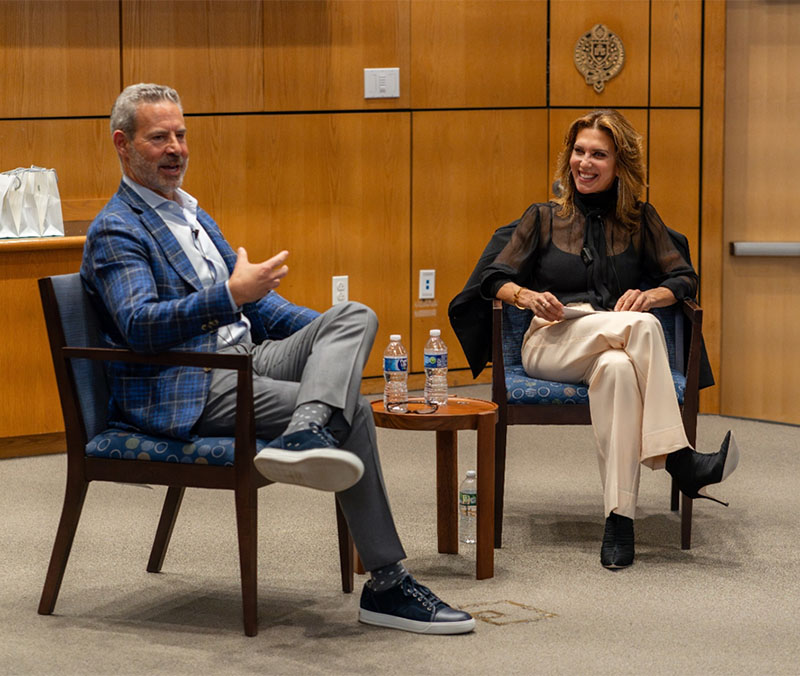Picket of Gotham Organization speaks at Fordham REI’s “Titan Talks”

Bess Freedman, CEO of Brown Harris Stevens and member of REI’s Executive Advisory Council.
Photo credit: Andrea Ceraso/Brown Harris Stevens Residential Sales, LLC
Manhattan, NY The Fordham Real Estate Institute (REI) hosted David Picket, CEO of Gotham Organization at its Lincoln Center campus for a wide-ranging conversation about succeeding in New York City’s highly competitive real estate sector. Led by Bess Freedman, CEO of real estate firm Brown Harris Stevens and member of REI’s Executive Advisory Council (EAC), the event was part of REI’s “Titan Talks” series, which features one-on-one discussions with leaders shaping the real estate industry and New York City’s landscape.
“It’s so important for our students to engage with and learn from industry leaders, and we thank you, Beth and David, for sharing your insight,” said EAC chairman Ryan O’Connor, president and CEO of Clinton Management.
“The EAC is focused on supporting tomorrow’s industry leaders, and we’re grateful to everyone helping us expand our Building Futures scholarship, which offers low-income New Yorkers access to REI’s courses and programs, and to careers in real estate and construction.”
Freedman explained to the students, real estate agents and other industry professionals in attendance that the purpose of Titan Talks is to give a behind-the-curtain look at some of the most successful companies and the women and men leading them.
Since joining the company in 1991, Picket has led Gotham Organization’s new project development business through a period of unprecedented growth. Gotham has developed more than 5,000 housing units and 1.7 million s/f of urban retail. The majority of Gotham’s developments have utilized public/private partnerships, combining public funds, tax benefits, and/or reduced land prices in exchange for the creation of affordable housing, schools, community facilities, job programs and other public benefits.
Picket is the fourth generation leading his family owned Gotham Organization; several of his children mark the fifth generation. Picket studied literature in college, then law, before pivoting to a legal career in real estate that began at Citibank during the restructuring boom in the late 1980s. “That’s what really got me interested in real estate, seeing it in its worst hour, from the bottom up, learning how to take apart transactions and put them back together,” Picket said.
A decade later, Picket joined his father at Gotham.
Freedman, who also started her career in law, pointed to advantages of having a diverse education. “It doesn’t matter where you start in a career, you gain knowledge. I was a prosecutor in my former life, but sometimes you find something else is calling you. Figure out your super-power, what you’re great at, and work toward that.”
Picket agreed, and advised students interested in real estate careers to have “patience.”
“I know that’s a tough one for a lot of Gen Z and Gen Xers – I have them as children – but real estate for the most part is not an immediate gratification business,” Picket said. “It requires a collection of many different skills. The ‘stuff’ you’re collecting along the way, which may frustrate you or you may not think is important, later in life you will draw on that reservoir of knowledge.”
Picket talked about the challenges in the markets now and advised people considering a career in real estate to “follow the money.”
“Where is the money flowing right now?” Picket said. “Clearly, office buildings are not a favored class. Despite more people going back to work, it’s a challenge. It’s going to take time until there is interest again in investing. Industrial has run its course. Hotels are coming back but are always challenging. Retail has found its bottom and there is some reinvestment going on. Rental multi-family seems to be the most stable asset. It’s the most predictable income stream and requires the least capital.”
The impact of rising interest rates curtailing deals and development across New York City also came into focus.
“Money is more expensive than it was,” Freedman said. “It was so cheap for so long, and now the Federal Reserve has raised interest rates eleven times, and that hike has had an immense impact. Whereas people were taking all sorts of risks in years past, today people are far more cautious. It’s tougher times overall.”
Freedman and Picket also discussed the lack of affordable housing in New York City.
“The tools are all out there,” Picket said. “We’ve done this before. In the 1970s the city was by far the biggest landowner in New York. We were producing 40,000, 50,000 units of housing a year, through the 1980s and into the 1990s because we had the proper incentive programs in place, creative Section 8 deals, Mitchell-Lama, etc. We still have really good tools, but the city has lost its way a little.”
AmTrustRE completes $211m acquisition of 260 Madison Ave.


Strategic pause - by Shallini Mehra and Chirag Doshi

Behind the post: Why reels, stories, and shorts work for CRE (and how to use them) - by Kimberly Zar Bloorian

Lasting effects of eminent domain on commercial development - by Sebastian Jablonski









.jpg)
.gif)
.gif)